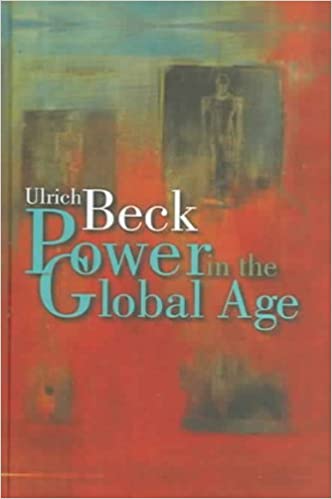
- Free Article: No
- Contents Category: International Studies
- Review Article: Yes
- Article Title: Cosmopolitanising the world
- Online Only: No
- Custom Highlight Text: A spectre is haunting the globe – the spectre of cosmopolitanism. You might discern it in the call by José Manuel Barroso, president of the European Commission, for a new kind of European justice, replete with regional police force (Europol) and magistracy (Eurojust). You might glean it from the global spread of human rights movements, protesting the suffering of children and civilians in, say, Iraq, Africa, Israel or Palestine. You might infer it from the cultural ties of, say, Chinese or Korean migrants living in Sydney, whose working lives embed them in global networks.
- Book 1 Title: The Cosmopolitan Vision
- Book 1 Biblio: Polity, $52.95 pb, 211 pp, 0745633994
- Book 1 Readings Link: https://www.booktopia.com.au/cosmopolitan-vision-ulrich-beck/book/9780745633992.html
- Book 2 Title: Power in the Global Age
- Book 2 Subtitle: A new global political economy
- Book 2 Biblio: Polity, $62.95 pb, 383 pp, 0745632319
- Book 2 Cover Small (400 x 600):

- Book 2 Readings Link: https://www.booktopia.com.au/power-in-the-global-age-ulrich-beck/book/9780745632315.html
Cosmopolitanism, for Beck, is an answer to the question of what we owe strangers by virtue of our shared humanity. The political form of this ethic is known as globalisation, for which, as Beck comments, the living of life is carried out in a milieu of blurring national distinctions and cultural ambiguities. Cosmopolitanism thus means acceptance of cultural mixture, which Beck believes is not always to the liking of authoritarian neo-liberal régimes. Beck’s key contention is that neo-liberalism, as a political system, is self-contradictory and self-mutilating. A vision of universal freedom which presupposed for its triumph the gains of Western modernity – material wealth, the rule of law, civil society – became, instead, the repressive mantra that we can live together only if nations are alike. In international relations, this is the view that only countries that practice democracy and value human rights can be legitimate, a view invoked by George W. Bush, Tony Blair and John Howard in launching the 2003 attack on Iraq. Beck packs a considerable punch against the neo-liberal creed. With a formidably stinging intelligence, he equates neolib-eralism with an American global dictatorship. As he writes, ‘Americans are now exporting American pessimism by infecting everyone else with their terror phobia’. But Beck’s sociology is more than merely the latest form of anti-Americanism. As he details here at length, the new cosmopolitanism must deal with a whole host of emergent global risks: xenophobic nationalisms, religious fundamentalisms, multinational monopolies. In both Cosmopolitan Vision and Power in the Global Age, Beck distinguishes two kinds of relation between politics and power in our time of transnational interdependencies. There is what he terms the ‘national outlook’, or ‘methodological nationalism’, which holds that politics should be principally concerned with the assertion of sovereignty, the policing of local or regional borders and the maintenance of exclusive identities. The national outlook, says Beck, is premised upon a full-blooded essentialist sociology that squares the circle between national and universal society, squeezing to the sidelines incommensurability in people’s attitudes, beliefs, values and orientations. By contrast, Beck speaks of the emergence of ‘cosmopolitanisation’, or ‘methodological cosmopolitanism’, by which he means to underscore internal processes of transformation affecting societies across the globe. Cosmopolitanism, for Beck, involves a positive pluralisation of national borders, a deterritorialised society, a mushrooming of globalism from within the nation-state.
Beck organises these books around topics. There are chapters on democracy, capitalism, transnationalism, civil society, new technologies and surveillance, war and much else. The tone throughout is relentlessly abstract, although concrete analysis of the recent wars in Afghanistan and Iraq are granted chapter sections. Each chapter unfolds in multiple directions, as Beck references philosophers, sociologists, political scientists, novelists and journalists in bringing cosmopolitanism as the culture of global capitalism to life. Beck’s sociological approach is thus reflective of its subject matter: this is a kind of cosmopolitan reading of how globalisation is cosmopolitanising the world.
I am broadly sympathetic with Beck’s main arguments against ‘methodological nationalism’, as well as with the more programmatic aspects of his case for cosmopolitanism, but it is surely a pity that he feels the need to carry so much anti-American ideological baggage. Yet it is not just his distaste for recent American unilateralism that mars his otherwise vigorous case for cosmopolitanism. For all his insights regarding emergent politics of cosmopolitan openness to cultural diversity, these books are in various ways relentlessly au courant. Whatever Beck’s intellectual reservations about postmodernism, the conceptual architecture of these books is inexorably modish in ways that clearly parallel postmodern theory: impeccably postnational, post-metaphysical, post-societal, post-internationalist and post-teleological. To the extent that Beck theorises his own position, he occasionally acknowledges that various postmodernists have trodden this terrain before: perhaps the best known is Jean-François Lyotard’s The Postmodern Condition (1979), where the argument was put that ‘one listens to reggae, watches a western, eats McDonald’s food for lunch and local cuisine for dinner, wears Paris perfume in Tokyo and “retro” clothes in Hong Kong’. Pace Lyotard, the constructive side of Beck’s cosmopolitanism is that there are compelling sociological reasons for believing that the world really is heading in a more post-national direction. However, if Beck really wants to put some distance between himself and postmodernism, he needs to stop to consider whether nation, state, region and the rest might not be a good deal more politically relevant to today’s transformed global realities.
Even so, the sociological significance of Beck’s vision of cosmopolitanism is undeniable, and these books offer suggestive mappings of the extent to which the world has moved more deeply in a cosmopolitan direction. What remains troubling, however, is the lack of political depth to Beck’s analysis, which at times threatens to sag into ideological naïveté. In rhapsodising this century’s brave new cosmopolitanism, these books sometimes appear unaware of its more virulent forms. If cosmopolitanism combines cultural openness with a cavalier disregard of place, this is because it is arguably a manifestation of the mentality of the upper middle classes. On this view, cosmopolitanism functions as the ideology of advanced capitalism. It allows white Westerners to jet around the globe, effortlessly living transnational lifestyles, crossing national borders almost as easily as money flows between multinational corporations. This supposedly universal and classless doctrine, however, screens from view those excluded from the privileges and wealth of global capitalism. Though Beck himself is by no means suggesting that cosmopolitanism is a purely positive category, I wondered still whether the sociology is not too insular: what of the millions (such as refugees and transmigrants) less well off than Beck’s global cosmopolitans? Undoubtedly, the world is becoming increasingly transnational, especially for those in the expensive cities of the West. But for the vast swathe of humanity, from rural Chinese peasants to women and children in Central Asia, the transnational capitalist system does not usually bring about cosmopolitan consequences. This point connects with other political difficulties to which Beck is insufficiently attentive. Beck’s language for capturing cosmopolitanism – ranging, as it does, across terminological innovations such as ‘individualisation’, ‘reflexivity’ and ‘cosmopolitanisation’ – is conceptually sophisticated and complex. Such labour of the theoretician, however, still doesn’t get around the fact that there are those who have access to cosmopolitan culture on the cheap, just as there are those excluded from its benefits. The relevant conflict here is between the politics of transnationalism and the politics of cosmopolitanism. Beck’s sociology betrays an incipient idealism in its heavily cosmopolitan bias. Tellingly, he passes over in silence the whole issue of how transnationalism and cosmopolitanism intertwine, and instead simply conflates the two. It remains, however, an intellectual sleight-of-hand to imagine that transnational activities always and everywhere lead to exactly the same process of cosmopolitanism. To suggest, for example, that someone watching satellite television necessarily also moves within the culture of cosmopolitanism may sound peculiarly idealist, patronising or politically naïve. Beck stands for a reflexive style of sociology – what he terms a ‘sociology of sociology’. Somewhat like Theodor Adorno’s notion of ‘constellations’, with its avant-garde analyses of social forms, Beck’s weaving of reflexive sociology is self-critically experimental in design. At its best, Beck’s writing is high-minded and inspired; yet too often the sociology seems to overreach itself, as if one were on a roller-coaster ride of ideas, concepts and theories. There is a sense in which these books – which, at any rate, are far too long and would have profited from some judicious editing – are furiously busy, stretching as they do from the European Enlightenment and Christian universalism to postmodern culture and the global electronic economy. Beck’s desire to say everything at once about the world notwithstanding, these books are primarily focused on European political developments. Nothing necessarily wrong with this; but given his grand claims for an emergent global cosmopolitanism, it is surely a defect that there are scarcely any detailed discussions of, say, Africa, East and South Asia or the Islamic diaspora. From this angle, these books fail to match the cultural richness of much recent research on cosmopolitanism. In the end, however, Beck is less interested in culture than in society, in particular how cosmopolitanism has assumed a new sociological significance. The emphasis on cosmopolitan forms of global community and solidarity, for all that, is much to be welcomed. Beck is out to provide us with a more complex relation between globalisation and cosmopolitanism, and his work thus represents a controversial political intervention into current theoretical debates. If, ultimately, these books veer somewhat unsteadily between the universal ambitions of grand theory and the specific dilemmas of power politics, it is partly because the big social changes with which Beck is concerned are still unfolding. As such, no one can say, with any degree of confidence, where global cosmopolitanism is taking us. And whilst Beck’s brand of cosmopolitanism is more concerned with transformations and transnational interdependencies than it is with nationalist politics or contemporary capitalism, this is because it is one of the most utopian of political ideologies – and, for that reason alone, provides fertile ground for alternative political futures.


Comments powered by CComment